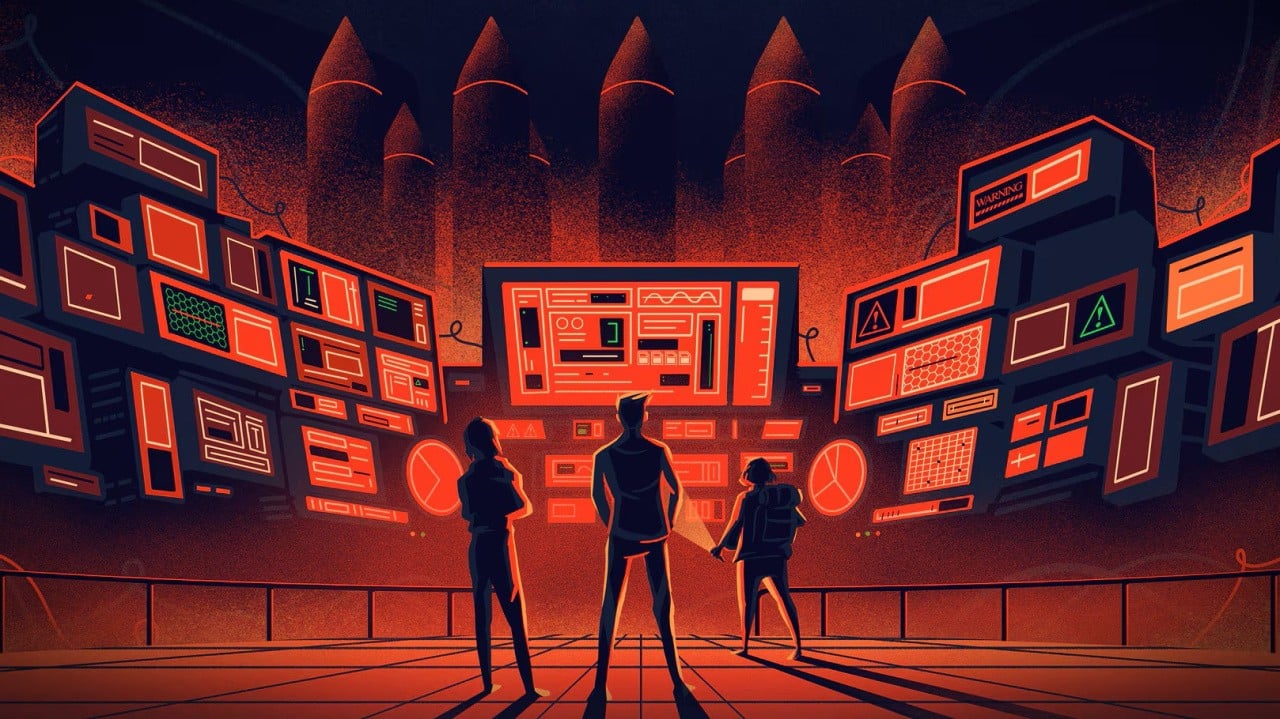 Captured on Nintendo Switch (Docked)
Captured on Nintendo Switch (Docked)
Missile Command Delta, from developers Mighty Yell (The Big Con) and 13AM Games (Runbow), is an experience of two halves.
The first is a turn-based strategy take on the classic Dave Theurer-developed arcade game Missile Command; one that shouldn’t work in theory, but genuinely does. The second is a misguided attempt to add context to the strategy gameplay by placing you in an underground bunker with a group of friends, forced to unlock its mysteries via first-person perspective. Frankly, I wish this second half had been left on the cutting room floor.
But let’s start with the positives. Located throughout the bunker are terminals through which you access the ‘classic’ Missile Command setup. Here, you take control of two computer displays: the left is an approximation of the original 1980 gameplay, with missiles making their way down a hexagonal grid to the bases that you need to protect; the right shows the arsenal of defensive missiles in your inventory, displayed as ‘cards’ that you can select to use on the playing field.
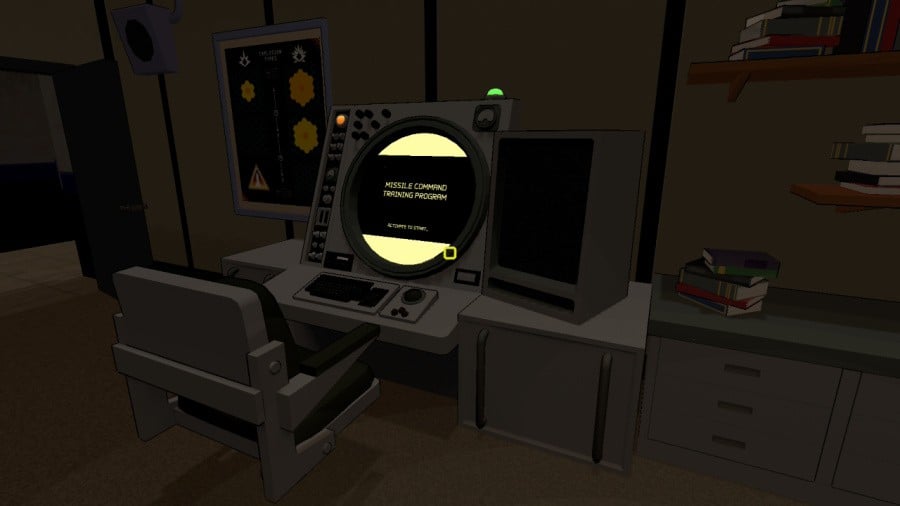 Captured on Nintendo Switch (Handheld/Undocked)
Captured on Nintendo Switch (Handheld/Undocked)
While the original game had you move a cursor with a trackball and point to the exact spot you wish to fire, Delta ditches this approach entirely. Instead, you select the missile you wish to use from the cards at hand, then choose from around two to four bases from which to fire. The game shows the projected path of both your own and enemy missiles, and so your objective is to wipe out all incoming fire without any reaching your bases.
The thing is, you can’t just select cards willy-nilly and be done with it. Each missile type has certain properties and energy costs. So, for example, the ‘M-21 Finch’ has a short range and low cost of 2, while the ‘FL-41 Terrier’ has a longer range, a larger explosion, and a higher cost of 5.
You can use as many cards as you wish to clear the screen until you run out, but in order to ‘ace’ each terminal, you need to keep your energy cost at or below the designated target. So if you have a target of 10 and use two ‘Terrier’ missiles at once, you’ve reached your energy limit in one go. You can keep going, but acing each terminal is often crucial to progressing the story.
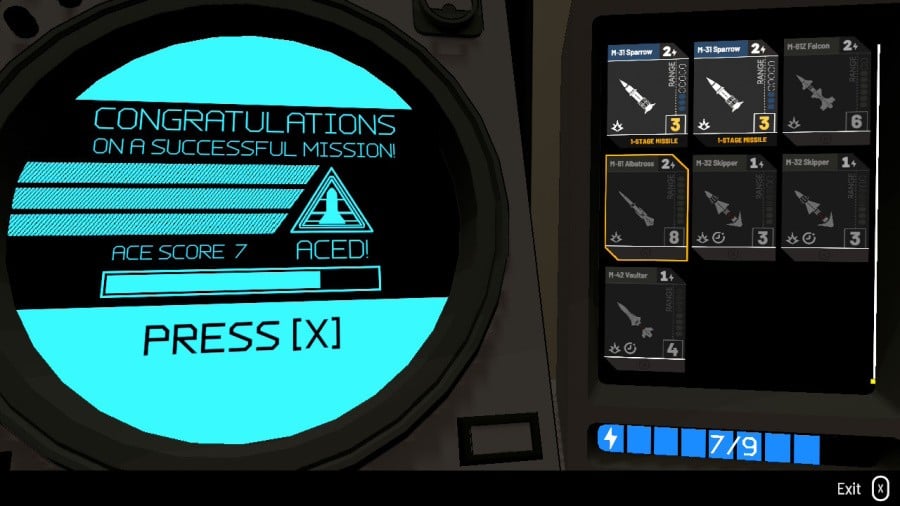 Captured on Nintendo Switch (Handheld/Undocked)
Captured on Nintendo Switch (Handheld/Undocked)
The game eases you into its strategy gently, but things can get real hairy later when you’ve got practically a dozen missiles to defend at once. You’ll get access to new types of missiles and even shields to accommodate, adding depth to the gameplay as you go. It can take a minute to get used to the slower pace if you’re familiar with the original Missile Command, but figuring out the optimum way to defend your bases is genuinely thrilling and satisfying.
It’s a shame, then, that this is surrounded by a nonsensical, boring narrative in which you explore an underground bunker to unlock new areas and terminals. You play as Skye who, along with her friends Adel, Marta, and Victor, decides to spend the night in a bunker before they all go their separate ways – as you do. An unknown war is quietly brewing in the background, so while they’re down there, attacks begin to occur. Sky, thankfully, magically knows exactly what to do and how to defend the area via the main terminal. Adel puts it down to Skye’s “gamer skills”. Okay, I guess?!
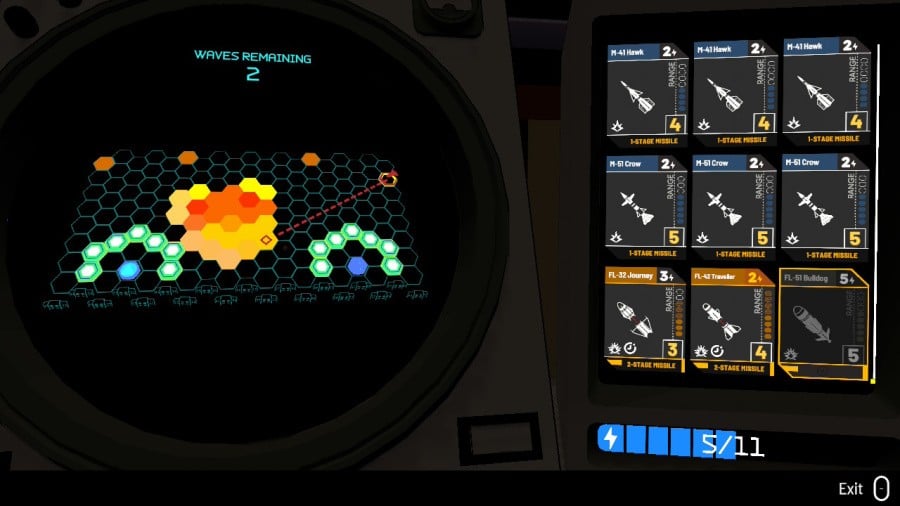 Captured on Nintendo Switch (Docked)
Captured on Nintendo Switch (Docked)
The thing is, it never really feels like there’s a war going on. There are zero stakes at play, and the characters pretty much just decide to keep messing around with the various terminals, because that’s apparently the key to their eventual escape. There are brief moments of intrigue that kept me interested – Who is the mysterious Khan character? And what were those footsteps in the lower level? It’s surface-level stuff though, and ultimately the decision to put you in the shoes of a teenager is misguided.
It feels like a play on the ‘isekai’ trope, it just doesn’t really work here, though. If I’m playing a Missile Command game, the stakes need to be much higher. I don’t need to read Victor jokingly ruminate on whether the previous bunker inhabitants washed the dishes or not.
As for the actual gameplay during these segments, you’ll slowly work your way around the bunker, opening cupboards and drawers, finding new missile cards, and flipping various switches to solve puzzles and access new areas. It’s fine, though the visuals leave much to be desired. Rooms lack detail and atmosphere, and so instead of feeling like you’re in a mysterious war bunker filled with stories and memories, you’re instead just going through the motions, desperately trying to advance the story as quickly as possible so you can find the next terminal.
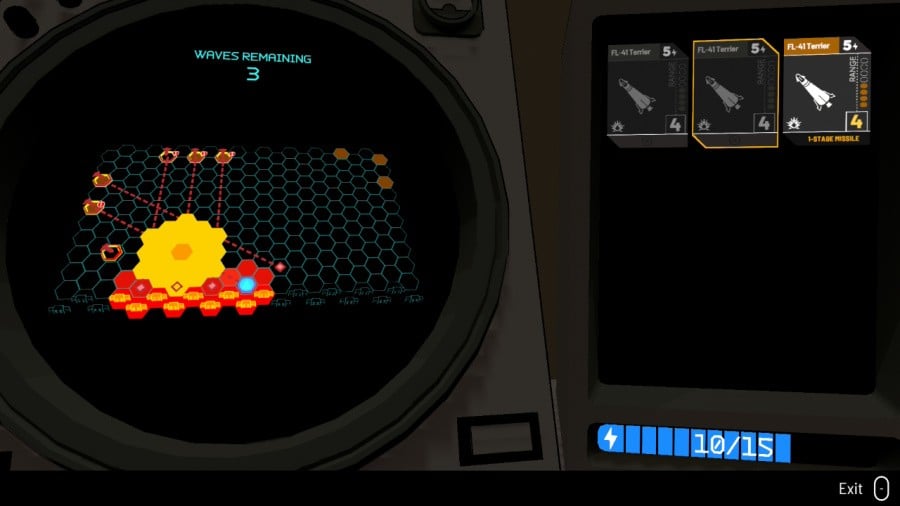 Captured on Nintendo Switch (Handheld/Undocked)
Captured on Nintendo Switch (Handheld/Undocked)
Credit where it’s due, however: the music is wonderful. It’s a mix of ethereal, retro-inspired ambient tracks and more intense renditions during the ‘proper’ Missile Command gameplay. If the visuals fail to make you believe you’re in a genuine underground bunker, the music triumphantly succeeds. It exudes mystery and intrigue, and I often found myself pausing at times and just letting it play in the background.
A quick note on performance: given the rudimentary visuals, I would have expected Delta to run at 60fps, but you’re looking at 30fps throughout on Switch. It’s consistent, however, and so I have no major issues in that regard. On Switch 2, the game runs perfectly fine for the most part, but if you happen to fail during a main attack sequence, it will often crash upon reloading. Definitely something to keep in mind, and an issue I’d imagine will be patched out fairly quickly.
Conclusion
Missile Command Delta is an unfortunate misfire from Atari. I want to love it; heck, I do love the actual turn-based strategy gameplay found within the various terminals. The problem is that it’s surrounded by dull explorative sections and a narrative that just doesn’t resonate.
There’s a really solid foundation here, and I’d love to see Atari explore Delta’s mechanics more in the future, but a bit more thought is required in how such an intriguing concept is delivered to the player.
